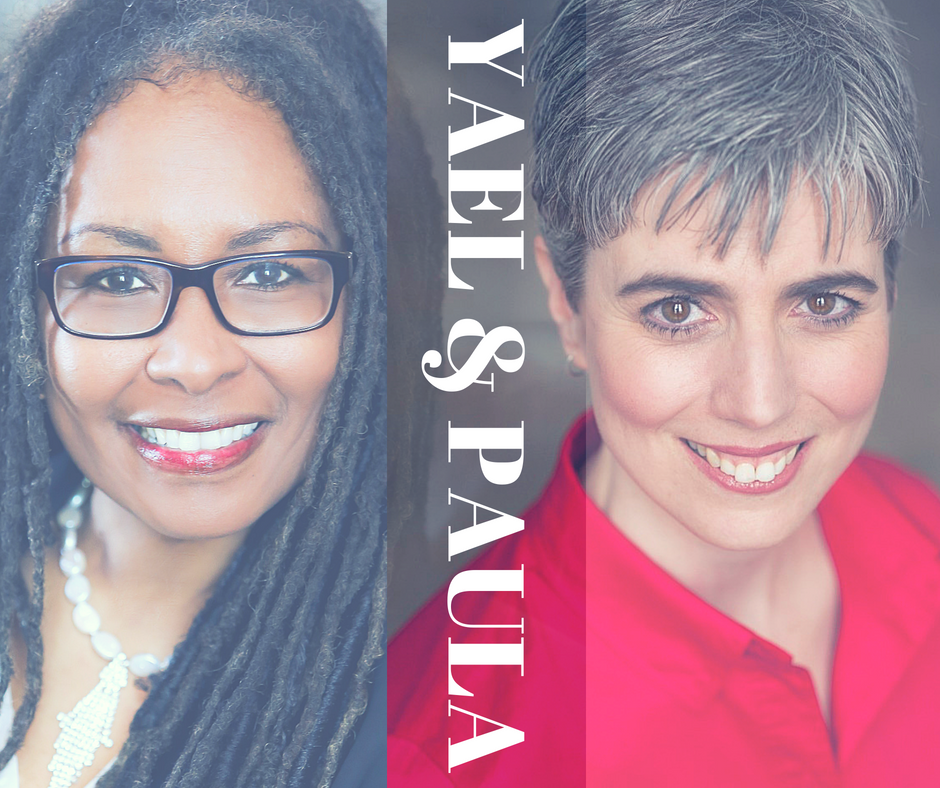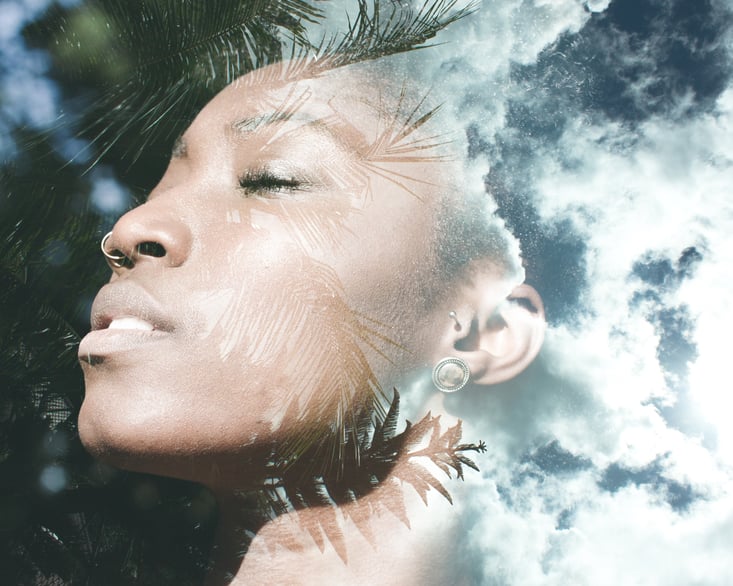
I am a Black woman married for 13 years to a white woman who grew up in a middle-class, academic family which endowed her with all the safety and privileges of whiteness and left her blind to the problems of race and racism.
One of the privileges she enjoys is her family's cottage on a tiny island in Maine, where approximately 300 other white families reside in the summer. Many of these families have been "summer-ing" on Cliff Island for generations, and each new parent is excited to introduce their own kids to this idyllic place that holds such fond childhood memories for them.
My wife, Yael, has her own fond memories of Cliff Island. For years, she would describe to me her vivid dreams of swimming in the "Cove," picking raspberries, heating up hot water for a bath in the antique metal tub in the kitchen, and gathering for elaborate dinners with summer family friends. Given all of this, I was excited when she first invited me to go there with her. I wanted to see this magical island!

One summer weekend, we drove the three hours to Portland, Maine, where the Casco Bay Lines ferries all begin and end. Yael became more and more excited the closer we got, pointing out details and sharing memories. Standing in line for the ferry with our tickets, I wanted to share in her excitement, but I was beginning to feel very nervous. As we got settled for the 1 1/2 hour ride to the island, my fear grew, and I suddenly started to feel as though I was suffocating, the same feeling I've experienced at my predominantly white professional conferences and throughout my academic and clinical training.
What Yael hadn't mentioned in all her reminiscing and what I could now see was that the folks who went to these islands were all white; I was the only Black person on the ferry. As I watched my wife basking in the sea-breeze, her face lighting up with childhood joy, I felt as if my very existence was being sucked out of me.
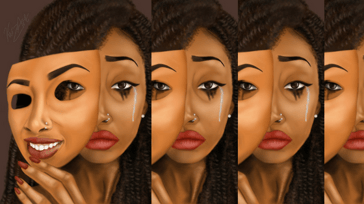
The psychological aspect of racism permeates social life. What I had been taught and internalized was that I was unworthy and should be fearful of whites. Internalized oppression and racism stifle the life force of the human spirit.
My invisible (or perhaps visible) agitation was intergenerational trauma seeking understanding and a dignified release. Yet I was paralyzed, rendered non-existent, and mute by the quiet, polished, blind veneer of white privilege and innocence all around me.
For long moments on the ferry, I felt my hateful childhood programming, the quiet rage, and deep distrust towards whites juxtaposed against a cold shock and questions of my own worth and value. I have always been able to acknowledge that I am a racial being; the problem was that I didn't know how to face it, to release the tight shackles of fear, self-hatred, rage, and alarm ringing in my mind. I was ready to have my rage enraged, and it intensified as I witnessed my wife's complete oblivion to what was happening with me.
White supremacy and whiteness have been an intravenous drip into Blacks' consciousness and folks of color for generations. With that, there is an internal dialogue, tightening, and pressure that we have learned to tolerate.
I chose not to communicate with Yael about how I felt as the "only" Black person on the ferry, and I made that choice out of emotional fatigue and fear of Yael diluting or dismissing my experience. I just wanted to try to fit in and be accepted. When we choose to tolerate racial distress and stay silent, we not only exile ourselves from our wholeness, but we also overlook and accumulate in ourselves a number of awkward, unconscious, ill-expressed intentions made by white folks. I made the decision to withdraw emotionally and physically from Yael so that I could re-calibrate a sense of safety and feel relief.
I was able to observe my wife's privilege like never before! Blindness is characteristic of white privilege, which made it difficult for Yael to see that most people on the ferry were white. Blacks and folks of color do not have the privilege of walking away from the racist wreckage that wreaks havoc not only on our families and communities but also on our individual identity. Social life and racial meaning are systemically and structurally dominated by whites. My mind and body felt trapped because I was trying to fit into this white culture, but I discovered that it was a false refuge that left me feeling angry, stifled, and alone.

Systemic racism and white supremacy have a violent impact on the psyche and body over generations. They also impact our natural impulse to envision the future. Generally, we are hardwired to see what's wrong and fight against it. Yet, we also need to imagine our lives beyond struggle and have a broader vision than resistance or conflict.
So, the question is: How do we have meaningful, honest conversations with each other around race and racism? How do two human beings with vastly different racial histories and realities raised in a country that denies, minimizes, or distorts these differences and provides no guidance or wisdom on how to talk about them, begin to reveal their tender truths to each other?
Yael revealed to me later that she had been confused and hurt by my reaction. She had seen the visit as an attempt to share a part of her history with me, a part of who she was, and my racial struggle detracted from her enjoyment.
White people can move easily through the world as "good people" unaware of their racial impact. However, for Blacks and folks of color, our skin is sensitive and irritated from such constant exposure. Until she really understood my experience and was able to hear the terror and distress underneath my anger, she dismissed it as exaggerated and a personal criticism. She felt blamed for the exclusively white setting and thought I was implying that she or her family was racist, so she defended herself. Since then, she has learned to name her reaction "white fragility."
On the ferry that day, race never even occurred to Yael. One of Yael's most significant privileges as a white person is that she can forget that I am Black and that she is white. But I can never forget that I am Black or that Yael is white.
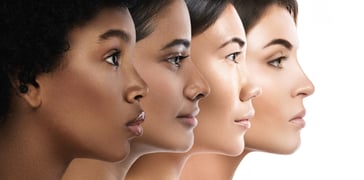
Since that experience, it has taken us a lot of years of Imago therapy, Imago workshops, Imago dialogues, Imago intensives, and conversations of coming unglued and knocking each other off our centers to learn how to be with what was happening racially within us and between us while it was happening. The manifestation of our relationship struggles and conflicts was visceral; a real battle was going on inside our minds and bodies, which we both had to face.
Research in psychobiology reveals that "our deepest emotions: love, fear, dread, grief, sorrow, disgust and hope involve activation of our bodily structures. Neuroscientists call this a wandering nerve or vagus nerve." Other practitioners have called it our "soul's nerve."
"Our bodies have a form of knowledge that is different from our cognitive brains. This knowledge is often experienced as a felt sense of constriction or expansion, pain or ease, energy, or numbness. Often knowledge is stored in our bodies as wordless stories about what is safe and what is dangerous. The body is where we fear, hope, fight, flee, or freeze." For Yael and I to upend the status quo of conflicts rooted in racial beliefs, racial harms, implicit bias, and old habits, we have also had to deal with what was happening in our bodies.
As a Black woman, I initially found myself faced with the awful burden of addressing my white partner about sensitive racial issues, which proved more difficult and painful than I could have imagined. What helped relieve me of feeling as though it was my responsibility alone to educate my partner about race was her waking up and educating herself around racial issues and her own whiteness and white privilege and how that manifests itself in our marital dynamics.
As Imago Therapists, Yael and I naturally gravitated to the Imago Intentional Dialogue, a three-step structured communication process that helped us create an emotionally safe space. The structure of the Imago Dialogue allows us to express our experiences without blaming or criticizing each other, which is crucial when talking about how racism lives in each of us.
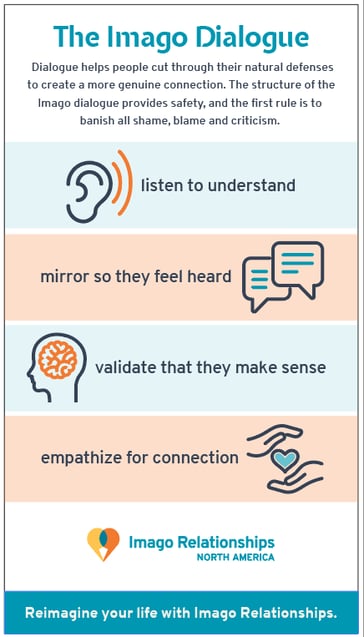
We committed to listening to each other with curiosity, putting aside our own internal reactivity, and racialized stories about each other. This kind of listening allows us to let go of (for Yael) her reflexive defensiveness, denial or minimization, and (for Paula) my reactive anger/rage, accumulative oppression, and self-victimization. We could then become present with each other, validate each other's points of view and legitimate experiences.
Here is an example of sentence stems for a Racial Dialogue that we developed and practice. It helps us become more conscious of the racialized stories that sometimes block intimacy and heal racial pain and trauma:
-
One racial story/belief that blocks me from being more intimate with you is …
-
How this story/belief fuels the way I show up with you is …
-
And then I react by …
-
Where I learned this story is …
-
How this belief is similar to or different from what I learned in childhood is …
-
As I say this out loud, what I am feeling is …
-
What sometimes makes it difficult to talk about my racial concerns/struggles/pain with you is …
-
The physical sensations that I am experiencing as I say this are…
-
How I imagine all of this might impact you is …
-
How I imagine all of this might impact our relationship is …
-
A new way I could show up when I experience racial distress or discomfort with you is ..
-
One way you can help me show up in this new way is …
-
How I imagine this could change our dynamic and deepen our intimacy is …
-
How I feel about what I am discovering about you is … and about myself is …
-
One thing I appreciate/celebrate about you is …
-
One thing I appreciate/celebrate about us is …
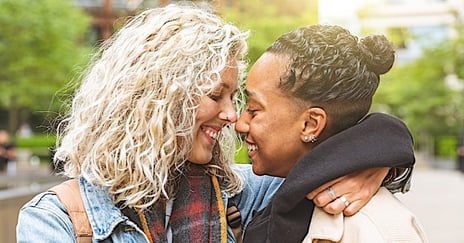
When we are in Dialogue, we commit to approaching our conversations with a mindset of curiosity, legitimizing, and giving equal validity to both our realities. There is no room for defending, playing victim, denying, or comparing suffering. These subjective experiences hold their own, different, embodied, and often painful truths.
As a daily practice, we hold an intention of creating emotional safety for each other to allow for the discovery and unfolding of these truths, laying the groundwork for our deepest racial wounds to surface and ultimately heal.
We heal when we feel seen and heard.
Yael and I are aware that racism is systemic. Racism is a social and structural force that privileges whites over Blacks and people of color. As an interracial married couple, we realize that privilege and oppression are always factors in our marriage and our lives. This cultural elevation of white identity and the parallel devaluing of Black folks and folks of color have led to internalized superiority for whites and internalized inferiority for Blacks.
Internalized superiority and internalized inferiority have resulted in white people overestimating their human value (unencumbered by race), and Blacks and folks of color underestimating their worth (based on race). As a result, white folks can become destructively entitled and takers while people of color can experience a pervasive sense of shame, failure, and loss of hope. Systemic racism and racial polarization are dangerous forces to civilization and our existence.
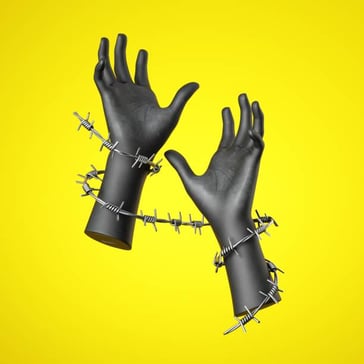
Black lives do NOT currently matter equally to white lives.
The myth of white superiority and inferiority of the "other" is a major threat to human dignity. On a global level, this myth leads to institutional disregard, where Blacks and folks of color's contributions are ignored, demeaned, and not recognized as valuable. This unspoken story was present in our couple dynamic, and acknowledging that racism and unearned racial privilege were operating within our interpersonal dynamics was not easy.
These issues are never easy. Misunderstandings happen, inherently creating new opportunities to engage one another. Imago Dialogue allows us the opportunity for self-examination, which means acknowledging our racism and/or privilege and choosing to make a conscious decision. Yael and I became witnesses to each other's racial stories, which promoted racial awareness and sensitivity in our relationship, leading us to create an atmosphere that was more welcoming, harmonious, comfortable, friendly, and empathic.
We all know our habitual impulses as they relate to racial harm and distress. Some of us lash out, some of us hold it all in, and some of us tune out, putting little energy into what distresses us or harms others. Our journey of racial awareness and healing has been productively messy because our hearts tend to lag behind. As much as we tried, we weren't always aware of how our oppression and privilege were operating. It is also messy because we are dealing with generations of racial suffering and ignorance. It is a delusion to believe that our hearts won't be broken again and again in this waking-up process and that we won't find ourselves often in the throes of fear, righteousness, and ill-will.
It has been eleven years since the tumultuous, angst-filled ferry ride to Cliff Island. As we cultivate mutual relational responsibility, we are creating new relational dances that are not solely dictated by constraining privilege and oppressive dynamics. When I talk with Yael about racial struggles and/or pain, she asks, "Tell me more about that." This helps me feel seen, validated, visible, and heard. I have learned to give voice to my racial suffering without lashing out, blaming, or playing the victim.
Our relationship patterns and stories are good places to begin noticing and renouncing old racial habits of harm and to shift toward caring and empathy, which is essential to racial awareness, racial identity healing, and transformation.
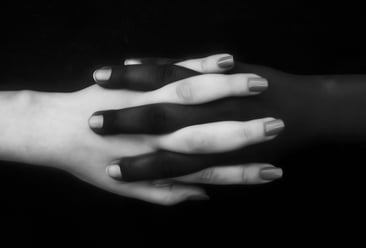
If you need help healing racialized trauma or experiencing interracial relationship issues, we're here to help. Check out our Imago Relationship Workshops and Imago Relationship Therapy. We have Online Therapy and Online Workshops now too!
Discover more about Imago with our Imago Professional Membership, Imago Professional Facilitators, Imago Professional Training, and Imago Educational Webinars.
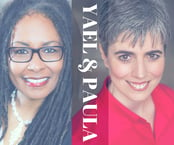 This blog post was written by Yael Bat-Shimon, LMHC, Certified Imago Therapist, Workshop Presenter & Paula M. Smith, Ph.D., MFT, M.Div., is an Adjunct Professor, Imago Faculty Candidate, Advanced Imago Clinician, Certified Imago Therapist, Workshop Presenter, and Consultant.
This blog post was written by Yael Bat-Shimon, LMHC, Certified Imago Therapist, Workshop Presenter & Paula M. Smith, Ph.D., MFT, M.Div., is an Adjunct Professor, Imago Faculty Candidate, Advanced Imago Clinician, Certified Imago Therapist, Workshop Presenter, and Consultant.Discover Yael and Paula’s website too!

